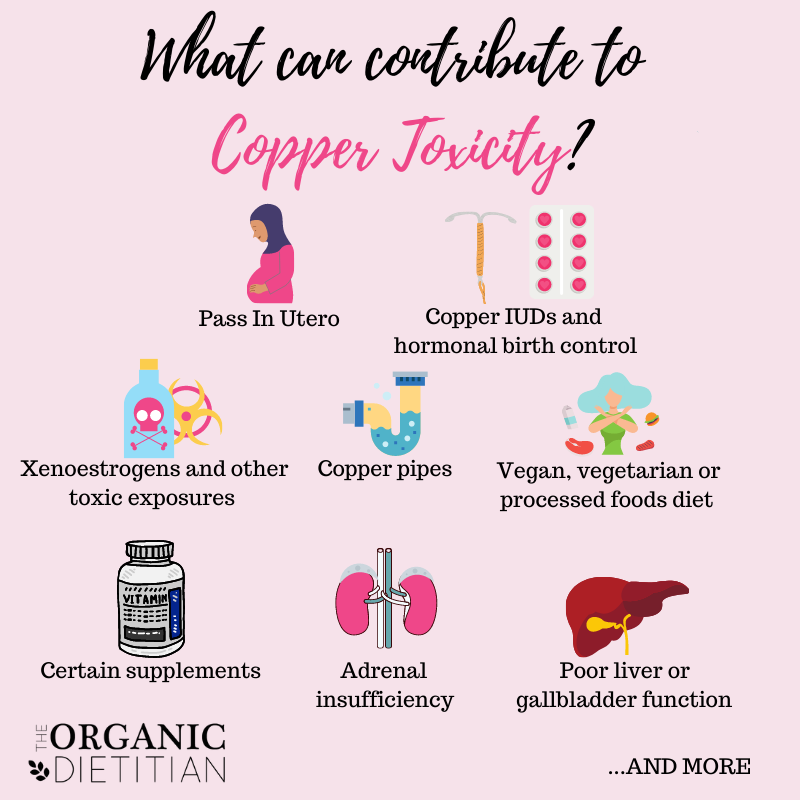11 February, 2021
The Complete Guide to Copper Toxicity

Are you dealing with copper toxicity?
You may very well be and have no idea!
Now copper is an essential nutrient so in general copper isn’t bad. However if we aren’t able to utilize it like we should or properly move it out of the body then it can become a big problem.
Copper toxicity is unfortunately something we in The Organic Dietitian practice see more and more frequently among clients. It’s an incredibly sneaky root cause of many different ailments and symptoms. Fortunately, once it’s properly identified, it can be properly addressed.
In this blog post, we explore all the ins and outs of copper toxicity:
- What is copper toxicity?
- Who should consider copper toxicity? What are the symptoms?
- What causes copper toxicity?
- How can you address copper toxicity?
What is copper toxicity?
Interestingly, copper deficiency and copper toxicity can have similar symptoms. But what we have to understand is that most copper deficiency in the West is actually caused by copper toxicity! This is because copper can be high in the body but it is bio-unavailable because of its location in soft tissues, like the liver and brain. So in short, it is there in large amounts but the body isn’t able to utilize it.
It is actually thought that a very small amount of the population has a true copper deficiency and the majority of people have a deficiency of bioavailable copper stemming from excess exposure or accumulation (more on this soon). We call this a “hidden” copper toxicity.
Excess copper acts as an excitotoxin, and as the copper level builds up, the adrenals eventually weaken from over stimulation.
This in turn leads to an eventual decline in the liver’s production of ceruloplasmin (a protein which binds to copper to make it bioavailable); and without adequate ceruloplasmin to bind to the copper, excess copper then gets stored in a bio-unavailable form in soft tissue – creating a deficiency condition.
In other words, the more copper the body accumulates (toxicity), the more likely the eventual deficiency of bioavailable (usable) copper. So it isn’t so cut and dry.

Who should consider copper toxicity? What are the symptoms?
Symptoms of copper toxicity can include emotional and mental health symptoms such as (note there can be many factors that contribute to mental health symptoms, this is just one consideration):
- Racing mind (feeling “wired but tired”)
- Panic attacks, anxiety, or ruminating negative thoughts
- Depression
- Lack of concentration
- Memory loss
- Manic mood swings
- Confusion or paranoia
- ADD
- Schizophrenia
- OCD
But it doesn’t end there. Other symptoms of copper toxicity include:
- Nausea
- Candida / yeast infections
- Constipation
- Fatigue and “adrenal fatigue”
- Hypothyroidism
- Hair loss
- Acne
- Chocolate cravings
- Anemia
- Allergies and mold sensitivity
- Lowered immunity
- Insomnia
- Joint aches and pains
- Hypoglycemia
- Headaches
- Excessive PMS symptoms
- Loss of sex drive
- Infertility
- Lower metabolism rate
How many of these symptoms look familiar to you? Could you be dealing with copper toxicity?
If you’re thinking the answer may be “yes,” you’re also likely thinking….
What causes copper toxicity?
How do you get copper toxic? Where does the copper come from?
First of all, it’s important to note that you don’t actually have to be exposed to a large amount of copper to become copper toxic. Let’s try to break it down a bit….

In utero exposure to copper
It can get passed down in utero. Meaning if your birth mother was copper toxic then she could pass it along to you before you are even born. This is one big reason why copper toxicity is becoming more of an issue — we continue to pass it down from generation to generation.
Exposure to synthetic estrogen
This includes hormonal birth control as well as “xenoestrogens” or toxic man made chemicals that mimic estrogen. Even if you took birth control for a while and stopped many years ago, that copper can still be an issue unless you have actively worked to address it.
Related Post: 5 Things I Wish I Knew Before Going on Birth Control
Copper IUD
Becoming more and more common, copper IUDs can unfortunately cause copper excess and toxicity. We hear about women all the time developing symptoms when getting a copper IUD put in. These symptoms are also many of the same listed above in regards to copper toxicity.
Copper pipes
If you live somewhere with copper pipes and you drink or shower with the water without a proper filter, you’re likely getting a daily dose of copper.
Vegan and vegetarian diets
Plant-based diets are high in copper and low in bioavailable zinc, which balances copper levels. Stomach acid can also be decreased, impacting mineral absorption and potentially copper levels.
Adrenal insufficiency
This is a BIG problem for many since excessive stress contributes to adrenal insufficiency and excessive stress is rampant these days!
Your adrenals help your liver produce ceruloplasmin, a copper transport protein. Copper needs this protein to be eliminated from the body. So as adrenals weaken, this biounavailable copper can’t be utilized by your cells and will start to get stored in places like your liver and brain — now the liver is even less capable of properly detoxing metals.
Vitamins and supplements
Some vitamins and supplements include copper. Many supplements may include certain other minerals that are creating more mineral imbalances can lead to an excessive amount of copper. This is why it is imperative that you always supplement smartly and with the guidance of a knowledgeable practitioner.
Occupational exposure
Some occupations increase exposure to heavy metals, including copper.
How can you address copper toxicity?
It’s easy to think that a quick “detox” protocol or taking a zinc supplement will be enough to address copper toxicity. But these are rarely sufficient and can sometimes do more harm than good!
NOTE: Please keep in mind that you MUST work with a TRAINED professional on this. You should definitely not try to do it yourself because it can be dangerous and mistakes can be made that can make you feel much worse. Learn about working with The Organic Dietitian Team and apply to do so here.
Want to learn how to interpret the hair tissue mineral analysis test (HTMA).

Holistic HTMA Pro is a 12-week certification program provides comprehensive and truly holistic training on interpreting and implementing the HTMA (Hair Tissue Mineral Analysis) through the lens of the impact of trauma, psychoneuroimmunology, which is the interplay between the psyche and the nervous and immune systems, epigenetics, whole-person/whole-system healing, and quantum coaching.
The program provides a wealth of knowledge, tools, and strategies for guiding clients to become empowered self-healers and create sustainable wellness in body, mind, and spirit.
Learn more about Holistic HTMA Pro HERE.
To properly address copper toxicity, you must:
1) Assessing your minerals with a hair tissue mineral analysis test
Each and every one of our clients take this incredibly valuable test — learn more about it here.
You must work on balancing other key minerals first. When mineral deficiencies or imbalances are present your body will more easily retain heavy metals like copper. There are numerous minerals you need to work on, not just zinc — calcium, magnesium, sodium, potassium, molybdenum, and manganese.
This will also support your metabolism and ability to push out metals from soft tissues. Check in on your minerals regularly (by retesting with your practitioner) to track progress and make adjustments.
Related Blog Post: Why Minerals Matter
2) Reduce your exposure to heavy metals
Consider the sources of copper exposure discussed above and which may be relevant to you. How can you reduce your exposure to these sources?
3) Support your liver, gallbladder, and bile
A properly functioning liver and gallbladder, with healthy, free-flowing bile, will help ensure copper and other toxins are being properly eliminated from your body.
Related Post: Keep Your Liver Healthy with these 5 Support Tools
4) Support gut health
Gut health is a key factor for any form of toxicity. First of all, it’s imperative that your digestive system is properly absorbing nutrients and minerals that will promote an overall balance. Secondly, the digestive system is a key detox pathway — a daily bowel movement ensures those toxins being eliminated by the liver through the bile are being properly expelled.
Related Post: Beyond Probiotics: 10 Key Factors in Healing your Gut
5) Reduce stress and support adrenal health
Your adrenals help your liver produce ceruloplasmin which is a copper transport protein. Copper needs a protein like this to help get out of the body. As adrenals weaken then this biounavailable copper can’t be utilized by your cells and will start to get stored in places like your liver and brain. Now the liver is even more impaired to help detox metals.
6) Prioritize nutrient-dense and organic foods as much as possible
Not only is a nutrient-dense diet a source of key minerals, but organic foods also tend to be lower in toxic heavy metal as a result of healthier soil. The copper must be made more bioavailable through supplementing the proper co-factors and raising ceruloplasmin. Which nutrients one needs will be different for everyone. This is why working with a skilled practitioner that will utilize testing like the HTMA is so important.
7) Be patient and consistent!
It can take time to address copper issues. For some, it may take years. So patience is key!
Client Case Study
Below is a before and after case study from one of our clients.
Meet Amy! She came to use back in March 2020 with complaints of anxiety, severe depression that got worse after she got her gallbladder removed in January (FYI- copper toxicity can also be one root cause for gallbladder issues because of its impact on estrogen- estrogen can make bile sludgy). She also had digestive issues including bloating, gas, gastritis, light colored stools that floated, saw undigested food in her stool, mood swings, fatigue that got worse during her period, insomnia, wired but tired. Any of these sound familiar?
She tried an antidepressant that didn’t help. Got blood work, and abdominal CT scan, Xrays, EKGs that were all “normal.” She tried diet changes, therapy, and journaling. She was offered birth control but didn’t want to go that route. Spending over $10K but was still suffering.
Since she knew we were well versed in gut and hormone she wanted to work with us to help her figure things out because she was overwhelmed and didn’t know where to start!
But since we did the deep investigating with a full health assessment and a few function tests including a GI MAP stool test, DUTCH hormone test, but also a HTMA hair mineral test we were able to put the pieces together for her. The copper toxicity that was obvious on her first HTMA test made SO MUCH SENSE! She had answers! But we were also able to let her know exactly what she needed to do and support her every step of the way.
After our 6 month program she is now reporting a BIG decrease in her anxiety and depression. Feels clear headed for the first time in years, less foggy, reports feeling like “myself again,” gas and bloating completely gone, no more visible food in stool, increase in sustained energy levels throughout the day, hair is growing faster, less emotional, and PMS symptoms decreased and are easier to manage. There is still work to do but she is getting her life back!


Let’s keep the conversation going in the comments!
Do any of the symptoms of copper toxicity look familiar to you? Have you considered copper toxicity before? Are you considering it now after reading the blog post? Any questions?
Please be sure to leave a comment so we can continue supporting you in your health journey!















 80% of chronic dis-ease is rooted in stre
80% of chronic dis-ease is rooted in stre
 As
As 

My husband and I are plumbers (for 30 years) so we work with copper almost every day. We also have copper pipes in our house and are PBWF vegans. I never realized that was an issue and I would really like to look into it. I didn’t notice what type of blood test we should get to cover this in your post? We don’t have health insurance but, would like to ask our doctor to set up whatever blood panel we should get that would cover this and maybe other metals/elements. Thank you for your input on this!
We don’t use blood tests for this. We use hair tissue mineral analysis testing in our practice. Blood tests will rarely show high copper as most of the time the copper is being stored so it won’t be floating around in your blood. High copper in the blood is called Wilson’s disease which is more rare but copper toxicity is much more common. Unfortunately a traditional doctor won’t use hair tissue mineral testing and you really need someone that is properly trained in interpreting it and assess you because the copper isn’t alway high initially but doesn’t mean you are toxic. Conventional doctors don’t know how to address this type of copper toxicity.
Her hair mineral analysis is identical to mine! Very high calcium, high copper! How did you resolve this for her?
That isn’t something I can advise on in a comment. There is no one size fits all approach. A good practitioner needs a lot of information from you to make the proper recommendations. It is also illegal to provide medical advice without being a client. It also wouldn’t be fair to our paying clients. I don’t advice trying to deal with copper toxicity on your own. You need to work with a skilled practitioner if you are serious about addressing it properly.
How do I become your client then I’d be willing to have you as a practicioner?
We have group programs and one on one programs. Our group program will be launching again in the fall. We currently have a waitlist for our one on ones but hope to be opening a couple slots late summer. You can join our waitlist…https://theorganicdietitian.practicebetter.io/#/59ea5b5d67c6b9105829080e/forms?f=5f74fd172a90290cc03e608a
Are you able to heal copper toxicity while living a plant based lifestyle?
Thank you for your time.
It will likely be a challenge but ultimately depends on the person. This website goes into more detail about the problems with vegan or vegetarian diets when it comes to copper issues..https://coppertoxic.com/diet-%2Fdigestion
I already have a HTMA test from elsewhere. My copper is above 55 and my sodium levels are also high… among others. Ratios are just off the charts. I am very healthy. I’m gathering most of it is from environment. There’s salt in our air and copper mining within city limits. I’ve started some liver detox protocols but I’m wondering if there’s a program I should follow or a reset I should do? I don’t want to do too much, too fast.
Hi Caz, I guess it ultimately depends on your definition of healthy. Ultimately we need an overall healthy body in order to process toxins and not accumulate them. So a detox protocol isn’t all that anyone needs in my experience. Following programs isn’t what promotes overall health. Health doesn’t come from protocols. Your high sodium levels are likely not from salt in the air rather stress/inflammation. My personal philosophy even when it comes to balancing minerals and addressing accumulation of things like copper requires a mind, body, and spirit appraoch. Otherwise we end up just chasing numbers on lab tests.
I have a hard time believing that my low copper is a toxicity just because I’m a slow oxidizer.
Just because someone is a slow oxidizer doesn’t automatically mean low copper is a toxicity (really it can be a biounavailability) but it is more common than not. One should also take symptoms, history of possible copper exposure or situations that we know can impact copper, as well as properly assessing the HTMA test. One always has the right to believe what they feel is going on with them and why.
My copper has tested very high. I had neurological/ cognition and physical conditions that seemed to stem from birth control. I take for pmdd. I’ve since stopped birth control but still have been getting paresthesia in my body. Doctors don’t know what to do with me.
Unfortunately many doctors won’t know. This is not something they know about unless it is Wilson’s disease which is rare.
Can Copper toxicity cause fructose intolerance? My daughter has a lot of the symptoms for it but also sugar/fructose intolerance. I’m trying to find her the right help but it has been difficult. I’d like to convince her father to get her hair tested.
Many things can cause fructose intolerance and generally health issues don’t happen because of one thing. Copper toxicity also doesn’t just happen so addressing any copper imbalances ins’t just about copper either. Overall health is supported via mind, body and spirit.
Hi, can you also recover from copper toxicity if you are (wholefood) plantbased? Are there clever ways to be plantbased and heal from it and prevent it coming back?
Not that I have seen. We can’t continue to do the things that cause harm and expect to recover. I mean one might be able to manipulate some things with supplements however foods based nutrients in most cases is best.
I am currently working with an FDN-P, but always value a second opinion. I realize you don’t offer one time sessions, but if I do a consult would you be willing/able to give me your input on the course of treatment I am currently on?
I probably won’t be able to speak to you specifically about the treatment you are on but I do provide a ton of value in my breakthrough sessions so you very well will walk away with more of a idea if you are on the right track.
I am interested in wellness because I’ve felt unwell for some time. I have received diagnosis like leaky gut, gut dysbiosis from a gi map and also copper toxicity from a htma and DAO deficiency. How long could one take to heal from all these issues, especially the copper toxicity? I’ve spent a year working on my gut health with my practitioner and only had the htma results two months ago. I still don’t feel that good.
Unfortunately there is no standard time I can provide as healing is a multifactorial process that often requires a significant overhaul in many areas of ones life. I can tell you that running labs and following protocols is often a very small part of the healing journey. Since I don’t know your case I can’t really speak on what might be preventing you from feeling better after a year. We would have to chat and get more information from you. Leaky gut, dysbiosis and copper toxicity are really just symptoms…not root causes so if those are what is being “treated” then there is likely a lot of missed healing opportunities.